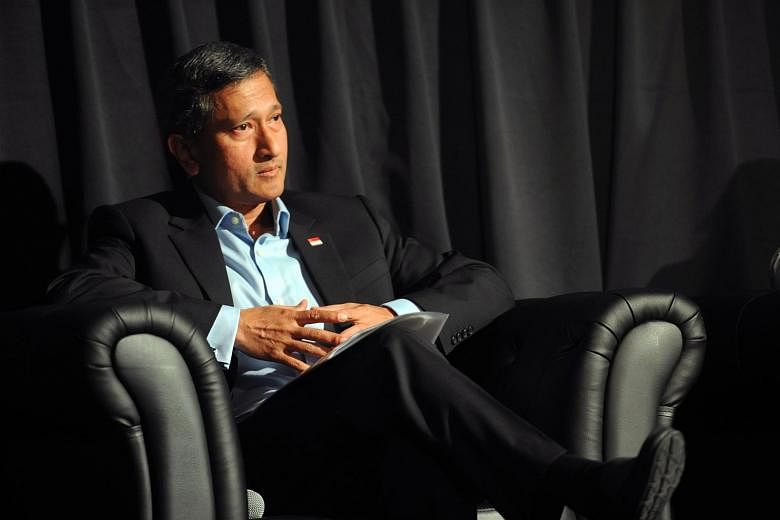Singapore has its "work cut out" as coordinator of Asean-China relations, Minister for Foreign Affairs Vivian Balakrishnan said on the eve of a visit to China, given the situation in the South China Sea.
Dr Balakrishnan, who is due to fly to China today, told Singapore media on the sidelines of the Asean Foreign Ministers' Retreat that the Republic, being a small country, firmly adheres to the concept of a rules- based world order.
"In other words, we cannot have a world in which might is right," he said in Vientiane. The ministerial retreat is the first of several Asean meetings to be held in Laos, the grouping's chair this year.
Dr Balakrishnan's remarks came just days after China deployed missiles and fighter jets to an island in the disputed Paracel chain, and the United States hosted Asean leaders to a summit which expressed concern over increasing militarisation in the South China Sea.
China claims almost the entire sea, but several Asean countries - most critically Vietnam and the Philippines - also claim parts of it.
"Clearly with developments which are going on on the ground in the South China Sea right now, this is an area of concern," Dr Balakrishnan said. "I think we will have to continue this discussion with China. It is something which we are going to have to work very hard on."
Asean countries have been encouraging strict adherence to international law for the peaceful resolution of conflicts or differences, with full respect for legal and diplomatic processes, he added.
"One area we have to focus very much on is the formulation of the Code of Conduct... (and) steps which will hopefully de-escalate tension and prevent any accidents or inadvertent escalation of tension and incidents at sea. I'm afraid we have our work cut out for us," Dr Balakrishnan said.
Laos' Deputy Prime Minister and Foreign Minister Thongloun Sisoulith, who chaired yesterday's discussions, said the ministers "remained seriously concerned" about developments in the South China Sea.
Some ministers, he said, were concerned over land reclamation and escalation of activities in the area which had "eroded trust and confidence, increased tensions and may undermine peace, security and stability in the region".
He added that the ministers had reaffirmed the importance of freedom of navigation and flight, and emphasised self-restraint and the resolution of disputes according to international law.
The ministers also called for a focus on implementing the 2002 Declaration on the Conduct of Parties signed by Asean and China, the precursor to a long-delayed Code of Conduct (COC) which Mr Thongloun said they hoped could be formulated in a "speedy manner". China has been dragging its feet on the COC, which will set guidelines for parties involved in disputes to manage tensions and avoid conflict.
The retreat was otherwise largely an agenda-setting meeting for Asean, which has seen since Jan 1 the technical implementation of the Asean Economic Community.
Laos, as Asean chair, proposed a focus on implementation of Asean's Community Vision 2025, including trade facilitation, narrowing development gaps, supporting small and medium-sized enterprises, tourism and connectivity, and decent work promotion.
Mr Thongloun said the ministers had discussed "emerging non-traditional security challenges such as terrorism, cyber security, natural disasters, climate change, irregular migration, trafficking in persons, and maritime security".
Singapore made a pitch for cooperation on cyber security, said Dr Balakrishnan.
"We are going to convene a cyber security conference in October; we hope to see full participation by Asean partners," he said.
The best way to deal with regional transboundary security threats was to "work together, to share intelligence, to make sure our enforcement agencies are able to work in a coordinated fashion so that we can deal with these problems".
He said Singapore also "made a pitch to operationalise the Asean haze-monitoring system, as well as the coordinating centre for dealing with the transboundary haze, which will be sited in Jakarta".

